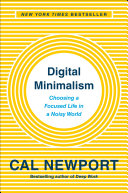

Digital Minimalism is a philosophy that advocates for a focused and intentional use of technology. The core idea is to reduce the clutter of digital distractions in our lives, allowing us to concentrate on what truly matters. This philosophy encourages individuals to evaluate their digital habits critically and eliminate unnecessary technologies that do not serve a meaningful purpose. By adopting this mindset, individuals can reclaim their time and mental space, leading to a more fulfilling and productive life. The philosophy emphasizes quality over quantity, urging users to prioritize experiences and relationships over mindless scrolling and consumption.
Continue readingIn a world inundated with digital distractions, the value of solitude has become increasingly overlooked. Cal Newport, the author, argues that solitude is essential for deep thinking, creativity, and personal growth. By intentionally creating spaces of solitude, individuals can foster a greater connection with themselves, leading to improved mental health and clarity of thought. Newport suggests that individuals should schedule regular periods of solitude away from screens, allowing for reflection and introspection. This practice can help people reconnect with their values and goals, ultimately enhancing their overall well-being.
Continue readingDigital decluttering is a process that involves systematically eliminating unnecessary digital tools and distractions from one’s life. Newport provides a step-by-step guide for individuals to assess their current digital usage and identify which tools add value to their lives. This process may involve deleting apps, unsubscribing from email lists, and minimizing social media usage. The goal is to streamline one’s digital environment, making it easier to focus on meaningful activities. Newport emphasizes that this decluttering process is not merely about reducing screen time but about making conscious choices that align with one’s values and priorities.
Continue readingOnce individuals have undergone digital decluttering, Newport advocates for intentional technology use. This means being deliberate about how and when we engage with technology, rather than allowing it to dictate our lives. Newport encourages readers to establish clear boundaries around technology usage, such as setting specific times for checking emails or social media. By creating structured routines, individuals can minimize distractions and enhance their productivity. Intentional technology use fosters a sense of control over one’s digital life, leading to more meaningful and purposeful interactions with technology.
Continue readingNewport emphasizes the importance of reconnecting with offline activities as a way to enrich one’s life beyond the digital realm. Engaging in hobbies, exercise, and face-to-face interactions can provide fulfillment that digital interactions often lack. Newport suggests that individuals should actively seek out offline experiences that align with their interests and passions. By investing time in these activities, individuals can cultivate deeper relationships, enhance their skills, and find joy in the present moment. This reconnection with offline life is crucial for achieving a balanced and fulfilling lifestyle.
Continue readingCommunity plays a vital role in the philosophy of digital minimalism. Newport argues that strong, supportive communities are essential for personal growth and well-being. He encourages individuals to foster relationships with others who share similar values and interests, creating a network that supports their goals. This sense of community can provide accountability and motivation, making it easier to maintain a minimalist approach to technology. By engaging with others in meaningful ways, individuals can enhance their social lives and find fulfillment beyond digital interactions.
Continue readingFinally, Newport discusses the long-term benefits of adopting a digital minimalist lifestyle. By reducing digital clutter and distractions, individuals can experience increased focus, improved mental health, and a greater sense of purpose. Newport highlights that digital minimalism is not just a temporary trend but a sustainable approach to living in a technology-driven world. The skills and habits developed through this philosophy can lead to lasting changes in one’s life, resulting in a more intentional and fulfilling existence. Embracing digital minimalism can ultimately help individuals thrive in both their personal and professional lives.
Continue readingThe reading time for Digital Minimalism depends on the reader's pace. However, this concise book summary covers the 7 key ideas from Digital Minimalism, allowing you to quickly understand the main concepts, insights, and practical applications in around 22 min.
Digital Minimalism is definitely worth reading. The book covers essential topics including The Philosophy of Digital Minimalism, The Importance of Solitude, Digital Decluttering, providing practical insights and actionable advice. Whether you read the full book or our concise summary, Digital Minimalism delivers valuable knowledge that can help you improve your understanding and apply these concepts in your personal or professional life.
Digital Minimalism was written by Cal Newport.
If you enjoyed Digital Minimalism by Cal Newport and want to explore similar topics or deepen your understanding, we highly recommend these related book summaries:
These books cover related themes, complementary concepts, and will help you build upon the knowledge gained from Digital Minimalism. Each of these summaries provides concise insights that can further enhance your understanding and practical application of the ideas presented in Digital Minimalism.